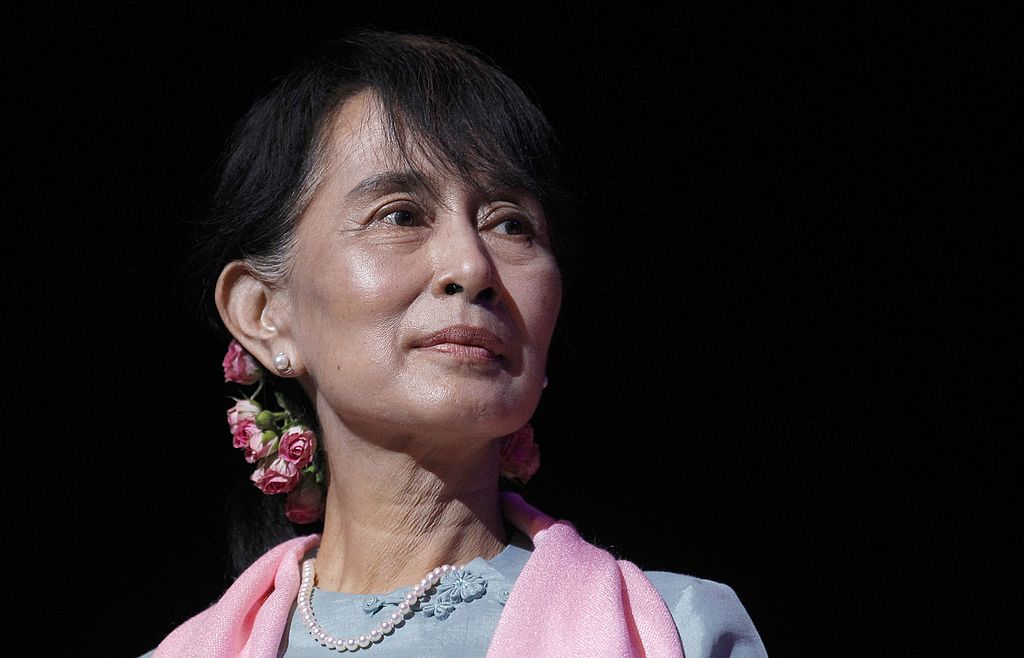The brutal generals ruling Burma – or Myanmar as they officially call it – seem to take us for fools. Today the junta issued a ‘partial pardon’ for the country’s jailed former leader Aung San Suu Kyi and reportedly transferred her from prison to ‘a more comfortable state-owned residence’. By doing this, they hope to score a propaganda win, creating the impression of leniency. It is vital though that the international community does not fall for this nonsense and sees through the regime’s lies.
Aung San Suu Kyi should never have been arrested and jailed in the first place. Her party, the National League for Democracy (NLD) – which is now outlawed by the regime – was re-elected by an overwhelming margin in 2020.
At the moment she should be about halfway through her second term, not detained at the mercy of power-hungry soldiers. Suu Kyi won a clear electoral mandate to govern, which was overturned not at the ballot box but by the military’s commander-in-chief General Min Aung Hlaing at gunpoint in a coup in 2021.
Min Aung Hlaing’s regime has no legitimacy. Indeed, the only way he could secure power was by locking up Burma’s true leaders. The charges against Suu Kyi – ranging from her possessing walkie-talkies and defying Covid-19 restrictions to trumped up accusations of corruption, electoral fraud and breaches of the official secrets act – are so absurd they should have been laughed out of court. There is nothing to ‘pardon’.
The junta’s pardon only relates to five of the 19 charges Suu Kyi faces, reducing her 33-year sentence by just six years. That means the 78-year-old Nobel Peace Prize Laureate still faces over a quarter of a century in jail. Unless the remainder of the charges are dropped, she will very likely die before she is released.
It is clear as day that General Min Aung Hlaing is not serious about reform. Only yesterday, his regime extended the state of emergency which has been in place since the coup, and delayed elections yet again. No one expects an election under this regime to be legitimate, especially if pro-democracy politicians are behind bars. But the junta is still clearly afraid of the ballot box, even though it can rig any election result. It would rather rule at gunpoint than risk another vote.
This is, after all, a regime that is committing crimes against humanity, war crimes and genocide. Since the coup it has caused the displacement of over 1.5 million people, scorched at least 70,000 homes and killed more than 3,747 civilians. It has also arrested over 24,000 people.
There is some hope. Today’s meaningless pardoning gesture shows at least that the junta is feeling some pressure from international sanctions. And it is struggling to eliminate resistance to its illegal rule.
That means this is a chance for the international community to increase and intensify the pressure on the reigme – economically, politically and diplomatically. The United States, United Kingdom, Canada and the European Union have taken steps in the right direction, with targeted sanctions against the military’s business holdings. But much more is needed.
The United Kingdom has started to sanction aviation fuel, in an effort to impede the military’s airstrikes against civilians – but it needs to persuade other governments to do the same, and to urge insurance companies to stop providing cover for aviation fuel deliveries. A global arms embargo was introduced by the UN in 2021, but more countries need to be encouraged to enforce it.
Burma is in ‘deadly freefall’ into ‘even deeper violence and heartbreak’, with the military regime engaging in a ‘systematic denial’ of humanitarian aid to its people, the UN Human Rights Council was told last month. International humanitarian assistance is desperately needed. Of course care must be taken to ensure aid does not fall into the military’s hands, but there are ways – for example, through local agencies – to ensure aid reaches those who need it. The United Kingdom’s decision to cut aid to Burma by 70 per cent at a time of dire humanitarian need in the country is just plain wrong and must be reversed.
Many will share my disappointment with Suu Kyi’s record in government. Many will rightly detest, as I do, her apparent complicity with the military’s genocide of the Rohingyas and her failure to stand up for the rights of ethnic and religious minorities in Burma. It is clear that she is not the saint the world made her out to be. But she does not deserve to be in jail, and she does not need a meaningless pardon from the real criminals, Burma’s generals.
The world must not allow its disillusionment with Suu Kyi to cause apathy or indifference to the plight of the people of Burma. These people deserve better. We must not rest until Burma’s political prisoners, including Suu Kyi, are released and the country’s military is consigned to barracks. Only then will Burma begin to move towards genuine peace and democracy.






Comments